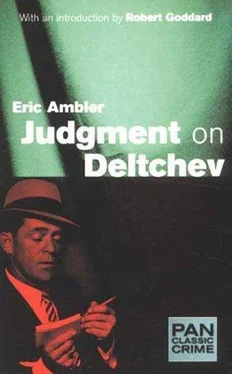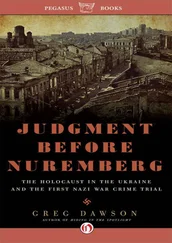Eric Ambler - Judgment on Deltchev
Здесь есть возможность читать онлайн «Eric Ambler - Judgment on Deltchev» весь текст электронной книги совершенно бесплатно (целиком полную версию без сокращений). В некоторых случаях можно слушать аудио, скачать через торрент в формате fb2 и присутствует краткое содержание. Год выпуска: 1977, ISBN: 1977, Издательство: Vintage, Жанр: Криминальный детектив, на английском языке. Описание произведения, (предисловие) а так же отзывы посетителей доступны на портале библиотеки ЛибКат.
- Название:Judgment on Deltchev
- Автор:
- Издательство:Vintage
- Жанр:
- Год:1977
- ISBN:9780307049971
- Рейтинг книги:4 / 5. Голосов: 1
-
Избранное:Добавить в избранное
- Отзывы:
-
Ваша оценка:
- 80
- 1
- 2
- 3
- 4
- 5
Judgment on Deltchev: краткое содержание, описание и аннотация
Предлагаем к чтению аннотацию, описание, краткое содержание или предисловие (зависит от того, что написал сам автор книги «Judgment on Deltchev»). Если вы не нашли необходимую информацию о книге — напишите в комментариях, мы постараемся отыскать её.
Judgment on Deltchev — читать онлайн бесплатно полную книгу (весь текст) целиком
Ниже представлен текст книги, разбитый по страницам. Система сохранения места последней прочитанной страницы, позволяет с удобством читать онлайн бесплатно книгу «Judgment on Deltchev», без необходимости каждый раз заново искать на чём Вы остановились. Поставьте закладку, и сможете в любой момент перейти на страницу, на которой закончили чтение.
Интервал:
Закладка:
‘Surely it’s easy enough to manufacture evidence?’
‘Yes, but that is not their way. Consider the case of Cardinal Mindszenty. He was accused of an offence against the currency regulations. We know that it was only technically an offence and not committed for his own gain, but he was guilty of it and that was the reason it was used. If he had been charged as a corrupter of youth it would have made much better propaganda, and no doubt the evidence could have been manufactured. But no — the currency offence could be proved. The lie stands most securely on a pinpoint of truth.’ He took the last of his twelve biscuits and shut the box. ‘What do you want of me, Herr Foster?’
‘You have already given me a great deal.’
‘I have a suggestion. Why do you not talk to Madame Deltchev?’
‘Is it possible?’
‘Yes, for you. She and her household are under protection — that is, they are not permitted to leave the house, which is guarded — but your permits will allow you to pass. I will give you a letter to her. She will see no other journalist, I assure you. You will make a coup .’
‘Yes, I see that. What kind of woman is she?’
‘She was a schoolteacher in the town where we practised years ago. She came of a Greek family. If she had married me instead of Yordan, perhaps I should have become a Minister. But better that you should form your own opinion. If you wish, I will come here every evening at this time to give you what information and comment I can.’ He leaned forward and touched my knee with his forefinger. ‘Is it agreed?’
‘Agreed. But what is my part of the agreement?’
He hesitated. ‘Money — a little, what you consider fair — and your ration card. Not the restaurant tickets — those you will need and I could not use — but the ration card for bread, meat, butter, milk, eggs, and green vegetables. As a foreigner, you have one on the highest scale, I think.’
‘Yes.’
‘You still have it? You have not already disposed of it?’
‘No. It’s yours. I’ll get it now.’
He sighed. ‘It is as well that my wife is not here,’ he said. ‘She would weep.’
Later, when he had gone, I sat by the window and had a whisky and water in the toothglass. I was beginning to feel perceptive and understanding.
That was the point at which I should have packed my bag and gone home.
CHAPTER SIX
In the afternoon of the second day of the trial the Prosecutor completed his opening address to the court and began to call witnesses.
The first was Vukashin, the head of the government. There was a stir as he went into the witness box.
He was one of those politicians who in their dealings with the public are like small-part actors who specialize in playing such things as shrewd lawyers, family doctors, and wise fathers; their mannerisms of speech and gesture have been cultivated to fit the stock characters their physical peculiarities suggest. He was square and solid, with a short neck, and he stood awkwardly in the witness box, his big hands clasping the ledge in front of him, the shoulders of his ill-fitting jacket hunched about his ears. He had blunt features, with a muscular jaw and full, determined lips. His forehead was low and permanently knitted in a frown of concentration. In the popular edition of his biography published by the Propaganda Ministry he was referred to as a ‘veteran front fighter in the class struggle’, and from the illustrations you received the impression that he had spent most of his life marching up steep hills at the head of fist-brandishing processions of angry revolutionaries. The role he affected was that of ‘simple workman’.
In fact he was not simple nor, strictly speaking, had he ever been a workman. His father had been a small but fairly prosperous tradesman, and Vukashin himself had been a bookkeeper in a timber warehouse during the early part of his political career. It had been a natural talent for accountancy and office organization rather than revolutionary ardour that had raised him first to the secretaryship of a trade union and later to leadership of the party. He had a reputation for the kind of wit that makes a political statement in terms of some excretory or sexual function. He was a powerful man physically and was said to have once made a brutal assault on a colleague who had opposed him. But it was also said that the victim had been alone in his opposition and unpopular and that the assault had been calculated quite coolly for its disturbing effect on the morale of other intransigent colleagues. He was a brusque, direct speaker and very effective with big audiences. ‘What are the real facts behind this problem?’ he would shout; and although he never answered such questions, the sturdy conviction with which he pretended to do so, and his way of enumerating his sentences so emphatically that they sounded like hammer strokes of logic, usually concealed the deception.
The Prosecutor’s self-effacing deference to him was so abject that it was not even amusing. From a ranting bully who at least existed, Dr Prochaska became suddenly no more than a disembodied, impersonal voice, a prompter who fed the witness with a short question and then waited until the speech in reply was over and another question was wanted from him.
‘Minister Vukashin, in March of 1944 when the armistice negotiations began, what was the attitude of the prisoner, Deltchev?’
‘Our policy was peace, immediate peace to save the country from devastation by reactionary led forces seeking to continue their losing battle with our Soviet ally. Every hour of it meant another cottage, another farm destroyed, every day a fresh horror for our peasant workers in the frontier areas. Who could have said “Go on”? Not a man with heart and bowels! Only a blood-maddened beast. But there was such a creature. His name was Deltchev!’
‘Minister Vukashin, in what ways did the prisoner Deltchev work against the peace?’
‘It would be easier, Public Prosecutor, to tell the court in what ways he did not work against the peace, for then I could answer shortly, “in no way”. From the beginning of the negotiations he used his position on the Committee to hinder their conclusion. You may ask why this was tolerated, why he was not immediately removed from his post. The answer to that is simple. We believed at that time that he was in misguided but honest doubt about the terms of the negotiations that were under discussion. We were a responsible group acting not for a defeated country — we were never defeated — but for a resurgent nation. The terms offered us by Russia, however, contained, as was natural in the circumstances, military clauses that involved our surrendering certain rights of government. The interpretation put upon them depended upon one thing and one thing only — whether or not Russia could be trusted. We of the People’s Party did trust Russia, and in the event we have been justified. All the rights surrendered by us then have now been restored. The prisoner took a contrary view — or said that he did, for we know better now — and it was this view that he urged upon us as a justification for delay and for continuing his negotiations with the Anglo-Americans.’
‘Did he contend that better terms would be obtained from them than from our Soviet ally?’
‘No. The terms were no different in essence. They had been agreed to by the Foreign Ministers at the Moscow Conference of ’43. According to the prisoner, what would be different was the way in which they would be enforced. Or so he said.’
‘Minister Vukashin, did the prisoner take part in the discussions with Soviet representatives?’
‘Very little. He was too busy licking the backsides of the Anglo-Americans.’
Читать дальшеИнтервал:
Закладка:
Похожие книги на «Judgment on Deltchev»
Представляем Вашему вниманию похожие книги на «Judgment on Deltchev» списком для выбора. Мы отобрали схожую по названию и смыслу литературу в надежде предоставить читателям больше вариантов отыскать новые, интересные, ещё непрочитанные произведения.
Обсуждение, отзывы о книге «Judgment on Deltchev» и просто собственные мнения читателей. Оставьте ваши комментарии, напишите, что Вы думаете о произведении, его смысле или главных героях. Укажите что конкретно понравилось, а что нет, и почему Вы так считаете.












